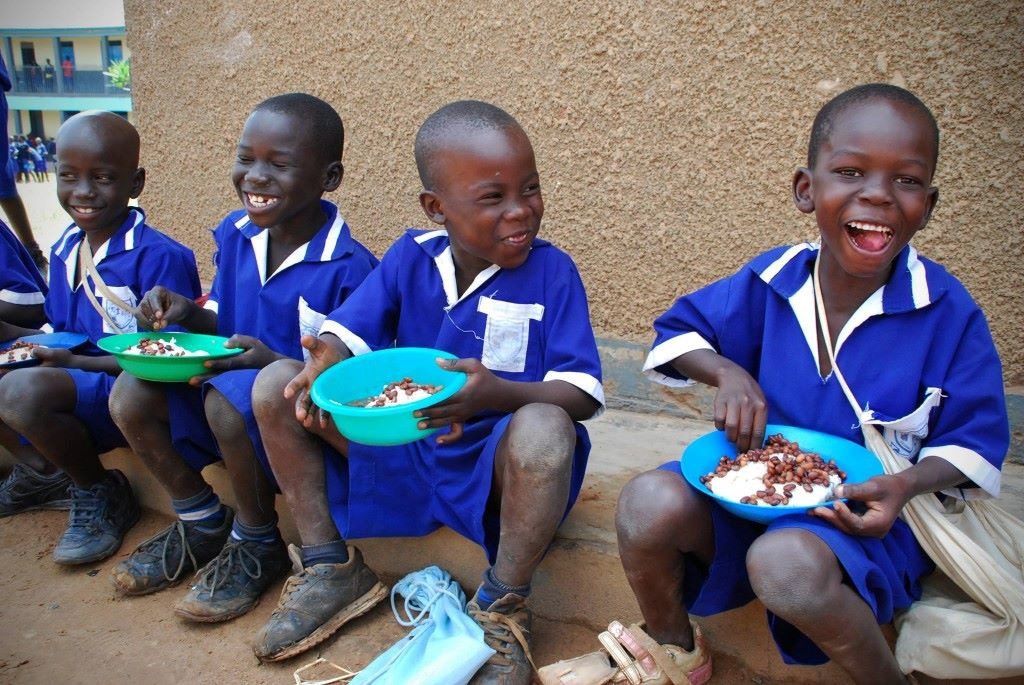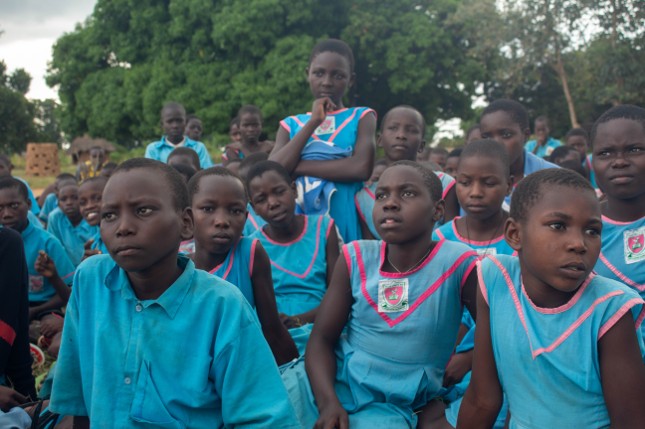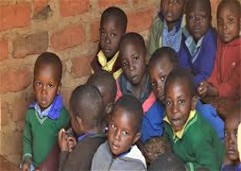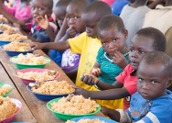Keep a child in school: One Meal at a Time

Municipality
Category / Sub-Category / Topic
Healthcare, Feeding
Type of investment needed
Grant
The challenge
The project
Know more...
Investment
(*): In kind/pro bonus
(**): Financing
Funds
Needed
Covered
Solicited
Investment
(*): In kind/pro bonus
(**): Financing
Sensitization: printing of 1000 flyers, 2 teardrops and 2 banners (**)
u$s 742.00
u$s 0.00
u$s 742.00
200 T-shirts - to be distributed to 200 stakeholders ie.50 parents, 20 Teachers, 10 Local Government, 120 for children in 3 schools (**)
u$s 1428.00
u$s 0.00
u$s 1428.00
Purchase of 3Flip charts (**)
u$s 17.00
u$s 17.00
u$s 0.00
Purchase of 3boxes permanent markers (**)
u$s 8.50
u$s 8.50
u$s 0.00
Fuel for the trainer (**)
u$s 25.00
u$s 25.00
u$s 0.00
Supplies for kitchen renovations: 90 iron sheets, 90 bags of cement, 15000 clay bricks, assorted Nails, 30 Iron bars, 15 trips of sand (**)
u$s 4314.00
u$s 0.00
u$s 4314.00
Construction fo Fuel Saving Stoves (1 stove per school for the 3 schools) (**)
u$s 2000.00
u$s 0.00
u$s 2000.00
Purchase of briquettes for cooking ( 19 bags of 100kgs per school per term) (**)
u$s 1454.54
u$s 0.00
u$s 1454.54
Purchase 12 of saucepans/utensils ( 4 per school) (**)
u$s 857.00
u$s 0.00
u$s 857.00
Supplies for establishing of 3 school gardens: 90 hand hoes, 30 pangas, 90 forked hoes, 30 Slashers, 30kgs maize seeds, 120 bean seeds, 60 assorted fruit tree seedling, assorted vegetables seeds. (**)
u$s 1598.00
u$s 85.00
u$s 1513.00
1 Laptop for Project coordination activities for M&E Officer (**)
u$s 1052.00
u$s 0.00
u$s 1052.00
4200 Liters of Fuel for use in the hired vehicle (**)
u$s 849.44
u$s 0.00
u$s 849.44
Airtime and data bundles ( Ugx 160,000 worth of airtime and data to coordinate project activities (**)
u$s 500.00
u$s 0.00
u$s 500.00
Hall hire (**)
u$s 85.00
u$s 0.00
u$s 85.00
Transport refund for 50 participants (**)
u$s 714.00
u$s 0.00
u$s 714.00
Transport refund for 15 committee members (**)
u$s 42.80
u$s 0.00
u$s 42.80
Labour for building (**)
u$s 2571.00
u$s 0.00
u$s 2571.00
Vehicle hire for 120 times used for travel to schools and other project activities (**)
u$s 721.76
u$s 0.00
u$s 721.76
Transport refund for 20 government officials (**)
u$s 549.00
u$s 0.00
u$s 549.00
Transport refund for 240 community stakeholders during meetings (**)
u$s 1000.00
u$s 0.00
u$s 1000.00
Monitoring field visits and 1 external Evaluation (**)
u$s 840.00
u$s 0.00
u$s 840.00
1 Project field officer (**)
u$s 1900.00
u$s 0.00
u$s 1900.00
1 M&E Officer (**)
u$s 1900.00
u$s 0.00
u$s 1900.00
Head office administrative overheads (**)
u$s 1270.28
u$s 0.00
u$s 1270.28
Holding 9 Community Radio talk shows - 3radio talks per term for each of the 3 schools (**)
u$s 513.00
u$s 0.00
u$s 513.00
Funds
Needed
Covered
Solicited
Sensibilización: impresión de 1000 volantes, 2 banderolas y 2 pancartas (**)
u$s 742.00
u$s 0.00
u$s 742.00
200 camisetas - para distribuir entre 200 partes interesadas, es decir, 50 padres, 20 maestros, 10 funcionarios del gobierno local, 120 para niños en 3 escuelas (**)
u$s 1428.00
u$s 0.00
u$s 1428.00
Compra de 3 carteles de papel (**)
u$s 17.00
u$s 17.00
u$s 0.00
Compra de 3 cajas de marcadores permanentes (**)
u$s 8.50
u$s 8.50
u$s 0.00
Combustible para el tallerista (**)
u$s 25.00
u$s 25.00
u$s 0.00
Suministros para renovaciones de cocina: 90 chapas de hierro, 90 bolsas de cemento, 15,000 ladrillos de arcilla, clavos surtidos, 30 barras de hierro, 15 viajes de arena (**)
u$s 4314.00
u$s 0.00
u$s 4314.00
Construcción de estufas de ahorro de combustible (1 estufa por escuela para las 3 escuelas) (**)
u$s 2000.00
u$s 0.00
u$s 2000.00
Compra de briquetas para cocinar (19 bolsas de 100 kg por escuela por trimestre) (**)
u$s 1454.54
u$s 0.00
u$s 1454.54
Compra de 12 sartenes/utensilios (4 por escuela) (**)
u$s 857.00
u$s 0.00
u$s 857.00
Suministros para establecer 3 jardines escolares: 90 azadas, 30 machetes, 90 azadas de horquilla, 30 cortadores, 30 kg de semillas de maíz, 120 semillas de frijoles, 60 plantones de árboles frutales surtidos, semillas de hortalizas surtidas. (**)
u$s 1598.00
u$s 85.00
u$s 1513.00
1 computadora portátil para actividades de coordinación del proyecto para el Oficial de Monitoreo y Evaluación (M&E) (**)
u$s 1052.00
u$s 0.00
u$s 1052.00
4200 litros de combustible para uso en el vehículo alquilado (**)
u$s 849.44
u$s 0.00
u$s 849.44
Recarga de teléfono y paquetes de datos (Ugx 160,000 en recarga de teléfono y datos para coordinar actividades del proyecto) (**)
u$s 500.00
u$s 0.00
u$s 500.00
Funds
Needed
Covered
Solicited
Alquiler de salón (**)
u$s 85.00
u$s 0.00
u$s 85.00
Reembolso de transporte para 50 participantes (**)
u$s 714.00
u$s 0.00
u$s 714.00
Reembolso de transporte para 15 miembros del comité (**)
u$s 42.80
u$s 0.00
u$s 42.80
Mano de obra para la construcción (**)
u$s 2571.00
u$s 0.00
u$s 2571.00
Alquiler de vehículo para 120 viajes realizados a escuelas y otras actividades del proyecto (**)
u$s 721.76
u$s 0.00
u$s 721.76
Reembolso de transporte para 20 funcionarios del gobierno (**)
u$s 549.00
u$s 0.00
u$s 549.00
Reembolso de transporte para 240 partes interesadas comunitarias durante reuniones (**)
u$s 1000.00
u$s 0.00
u$s 1000.00
Visitas de monitoreo en campo y 1 evaluación externa (**)
u$s 840.00
u$s 0.00
u$s 840.00
1 Oficial de campo del proyecto (**)
u$s 1900.00
u$s 0.00
u$s 1900.00
1 Oficial de M&E (**)
u$s 1900.00
u$s 0.00
u$s 1900.00
Gastos administrativos de la oficina central (**)
u$s 1270.28
u$s 0.00
u$s 1270.28
Funds
Needed
Covered
Solicited
Realización de 9 programas de radio comunitarios: 3 programas por trimestre para cada una de las 3 escuelas (**)
u$s 513.00
u$s 0.00
u$s 513.00




